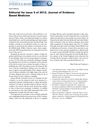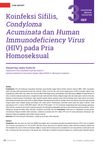 210 citations
,
November 2015 in “The Lancet HIV”
210 citations
,
November 2015 in “The Lancet HIV” PrEP for HIV is less effective in transgender women mainly due to low adherence to the treatment.
23 citations
,
March 2019 in “AIDS Care” Remembering to take PrEP is the main challenge, and urine monitoring is a preferred adherence method.
 August 2012 in “Journal of Evidence-Based Medicine”
August 2012 in “Journal of Evidence-Based Medicine” The issue discussed China's research contributions, systematic review improvements, and featured various medical studies and trials.
 14 citations
,
March 2020 in “Journal of Medical Internet Research”
14 citations
,
March 2020 in “Journal of Medical Internet Research” PrEP implants are promising for HIV prevention if the number of implants needed is minimized.
 August 2022 in “MEDICINUS”
August 2022 in “MEDICINUS” A 22-year-old homosexual man was diagnosed with secondary syphilis, genital warts, and HIV, highlighting the high STI risk in men who have sex with men.




